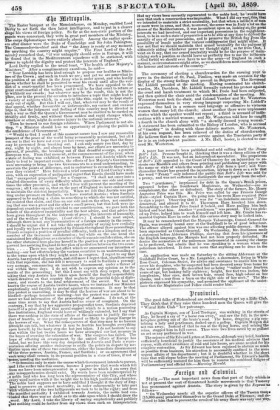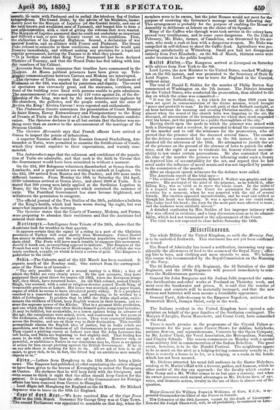"Fun* nut ifolunifil. - Si a IC—The most important news from
that part of Italy which•is not at present the seat of threatened hostile movements is that Tuscany has pronounced against Austria. The story is given by the Express ts follows-
" On Wednesday nearly all the superior officers of the Tuscan troops (15,000 men) presented themselves to the Grand Duke at Florence, and de- clared to him that to prevent the revolt of his army there was only one way,
namely, tJo unite with Piedmont and to unfurl the tricolour flag of Italian hidipe ems°. The Grand Duke, by the advice of his Ministers, irame- nt for the Marquis of Lajatico (of the Corsini family, and one of known and wealthiest men of Tuscany), and begged him to form a new ad inistration with a view of giving the reforms that were wanted. The l rquis of Lajatico answered that he could not undertake se important and a cult a task, or save the dynasty except on two conditions. First, the abdication of his Imperial Highness. Second, a declaration of war against Austria, and an alliance with France and Piedmont. The Grand Duke refused to subscribe to these conditions, and declared he would quit Tusoany immediately, and without making any provision for a legal and reb•uliir government, leaving the Tuscans to do what they pleased.
b`) It )is further stated that King Victor Emmanuel has been declared Iiietator of Tuscany, and that the Grand Duke has fled taking with him die members. of his Cabinet.
.g`,..4.c.counts from Genoa announce that troubles have commenced in the Itiirs es. At Massa political prisoners have been given up. Tele- jp communications between Carrara and Modena are interrupted. ,Qpinione of Turin reports that the sitting of the Parliament of Rioduiont on the 23d, was marked by patriotism and dignity. The crowd of spectators was extremely great, and the staircases, corridors, and front of the building were lined with persons unable to gain admission. e announcement of the acceptance by 110 votes against 24, of the dic- rship of the king, was met by the most demonstrative applause by c chambers, the galleries, and the people outside, and the cries of Avviva the King ! Evviva Cavour !.were repeated and enthusiastic.
The Piedinonteee Gazette announces the presentation of Count Brassier de Saint Simon, Envoy Extraordinary and Plenipotentiary to the King of Prussia at Turin as the bearer of a letter from the Germanic confede- ration. The Opinion declares it as all but certain that the letter was no- thing more than an answer to the announcement of the marriage of the Princess Clotilde.
The Corriere Mercantile says that French officers have arrived at Genoa to inspect the points of debarcation. A superior Russian officer and the Russian General Stackelburg, Am- bassador at Turin, were permitted to examine the fortifications of Casale, which they found superior to their expectations, and warmly com- =ended.
The Independents says that the calmness and confidence of the popula- tion of Turin are admirable, and that such is the, faith in Cavour that the disarmament would have been submitted to without a murmur.
On the 23d, 200 Bolognese volunteers disembarked at Genoa from the Lombardo,- and a great number are waiting to embark at Leghorn. On the 22d, 180 arrived from Mantua and the Duchies, and 200 more under different banners. From Monday the 18th to Saturday the 23d April, 3500 volunteers arrived at Genoa alone, and about 2000 at Turin. It is -stated that 300 young men lately applied at the Sardinian Legation in -Rome, for the visa of their passports which contained the sentence of exile. The Pontifical Government has since become frightened, and withdrawn the permission to emigrate.
The official journal of the Two Sicilies of the 20th, publishes a bulletin Of the King's health, which had been worse during the night, but was somewhat- improved in the morning.
The Opinion states that the Courts of Tuscany, Modena, and Parma, were preparing to abandon their residences and that the Austrians had .entered their states.
3E nutturgr II.—Intelligence from Trieste of the 20th, shows that the Austrians look for troubles in that quarter. It appears certain that the signal of a rising in a part of the Christian -provinces of Turkey will come shortly from Montenegro. Prince Daniel _has money in abundance, and the neighbouring population regard him as .their chief. The Porte will have much trouble to suppress this movement, should it break out, as everything appears to indicate. The Empress of the French has sent to the Princess of Montenegro, for a child of which she was lately confined, a cradle on which is fixed a crown of gold. The Empress is godmother to the child."
niall.—The Calcutta mail of the 22d. March has been received. It repeats, much of the Bombay mail. One extract from the correspond- .e foe of the Tuna is of interest- " The only possible leader of a second mutiny is a Sikh ; a fact of which the. Sikhs are very clearly aware. By the last accounts, they have ratponed their great throw for empire till 1863, when the European troops will, they think, have returned home. An old Sikh colonel, named Cheyte Singh, was accused, with a saint or religious devotee named Boodh Sing, of treasonable practices at Lahore. His house was searched, and a paper found, copies of which he seems to have circulated pretty widely. It is a prophecy couched in a somewhat mystical tone, and 'professing to be written by a i Sikh of Jubbulpore. It predicts that in 1863 the Sikhs shall arise, exter- minate the children of Christ, keep English women in their houses, and re- store the supreme power of the Khalsa. That is a pleasant little prediction, rind one which the Sikh very often thinks himself quite competent to realize. It may be fulfilled, but meanwhile, as a lesson against being in advance of the age, the conspirators were seized, tried, and condemned to five years at the Andaman, all within forty-eight hours. They were conveyed instantly across the frontier, and are on their way.to their destination. This terrible promptitude alarms the English idea of justice, but in India rebels are anarchists, and the first business of all Governments is to prevent anarchy. They expect a plotting season at Lahore now that Sir John Lawrence has left India., and Sikhs are beginning to feel slightly dull. That feeling has more to do with rebellion than we are apt to allow. However rich, or powerful, or ambitious a Native in our dominions may be, there is no sphere of action for him except plotting against the British Government. If he is on our side there is nothing for him to do. All we ask of him is to sit quiet, to grow rich, to be, in fact, the fatted hog an ambitious man usually objects to he."
t hitt ft .—Letters from Hongkong to the 15th March bring a little news. The Emperor had published an edict repudiating the orders alleged to have been given to the braves of Kwangtung to molest the Europeans at Canton. He declares that he will keep faith with the foreigners, and even seems to think it right that the allies should keep Canton for the present. It is significant that the office of the Commissioner for Foreign affairs has been removed from Canton to Shanghai. Lord Elgin left Hongkong for England on the 2d March. Sir Michael Seymour was to leave on the 19th for England.
top Of foot Maim—We have received files of the Cape Town Mai; to the 16th March. Governor Sir George Grey was at Cape Town. The second Parliament Was appointed to assemble on that day, when the byesbee
members were to be sworn, but the joint Houses would not meet for the purpose of receiving the Governor's message until the following day. 'This arrangement is probably for the purpose of enabling the House of Assembly to deliberate at leisure on the choice of its Speaker.
Many of the Caffres who through want took service in the colony have proved very troublesome, and in some cases dangerous. On the 12th of February, Mr. Blake farmer, of Camdeboo, was threatened by his ser- vant, who made a rush at him with a dangerous weapon. Mr. Blake was compelled in self-defence to shoot the Caffre dead. Agriculture was pro- gressing satisfactorily at Wittenberg. Small pox had not disappeared entirely from Port Elizabeth ; on the 8th of March, thirteen cases were under treatment in the public hospital.
.18 W.—The Kangaroo arrived at Liverpool on Saturday with advices from New York to the 9th.
Lord Lyons, the new Minister to the United States, reached Washing- ton on the 8th instant, and was presented to the Secretary of State Lord Napier. Lord Napier was to leave for England in the Cameos, without delay.
The trial of Daniel E. Sickles for the murder of Philip Barton Key commenced at Washington on the 7th instant. The District Attorney for the United States, who eonducted the prosecution, thus alluded to the day on which the crime was committed— It was the Sabbath-day, a day which for more than 1800 years has been set apart in commemoration of the divine mission, which brought peace and goodwill to man.' In the soft gush of that Sabbath sunlighfj at an hour between the morning and evening Christian sacrifice, at the time almost when the sound of the church bells was lingering in the air, the deceased, all unconscious of the tremendous wo which then stood suspended \ over his house, met the prisoner in a public thoroughfare of the city.'
Having dwelt upon the mode in which the prisoner was armed with both a Derringer and a revolver, he proceeded to detail the circumstances of the murder and to call the witnesses for the prosecution, who all proved that the prisoner shot the deceased several times. The counsel for the defence commenced his speech on the 9th instant, it was not finished till the afternoon of the 10th. He attempted to justify the act of the prisoner on the ground of the absence of laws to punish the adul- terer, and the right of man to vindicate his honour without account- ability to law under certain provocations. He also contended that at the time of the murder the prisoner was labouring under such n frenzy as deprived him of accountability for the act, and argued that he had acted under the influence of moral mania and was not impelled by passion to the commission of the murder.
After an eloquent speech witnesses for the defence were called. The American report of the trial says-
" The evidence of the Honourable Robert J. Walker was graphic and bit ressive. His portrayal of the grief of the prisoner, as he beheld it, after killing Key, was so vivid as to move the whole court. In the midst bf it a request was made to the Court for permission for the prisoner to retire for a moment, when he was removed with the aid of several friends. His emotion appeared uncontrollable, and he wept and sobbed as though his heart was breaking. It was a spectacle no one could resist. The Judge bent his head ; the Jury for the most part were affected to tears ; and the audience were similarly moved."
A detailed confession by Mrs. Sickles of her improper intimacy with Key was offered in evidence, and a long discussion arose as to its admissi- bility, which had not terminated at the adjournment of the Court. The trial was not expected to close before Saturday the 16th.



























 Previous page
Previous page